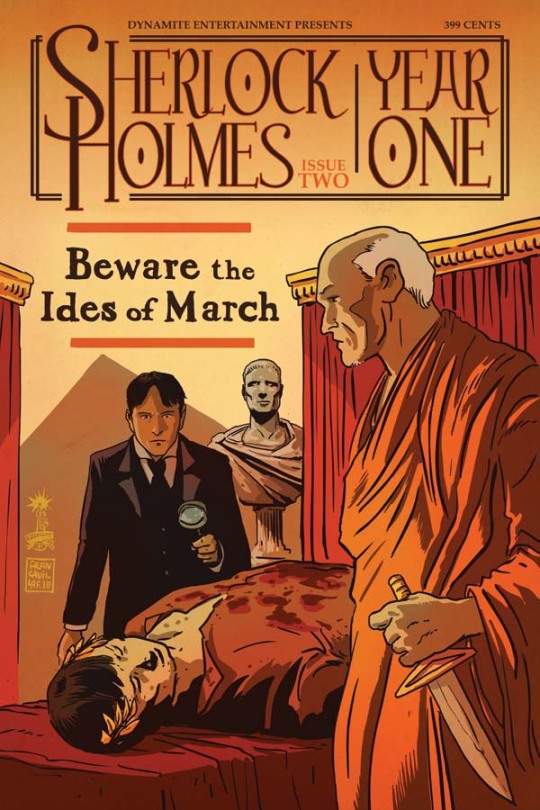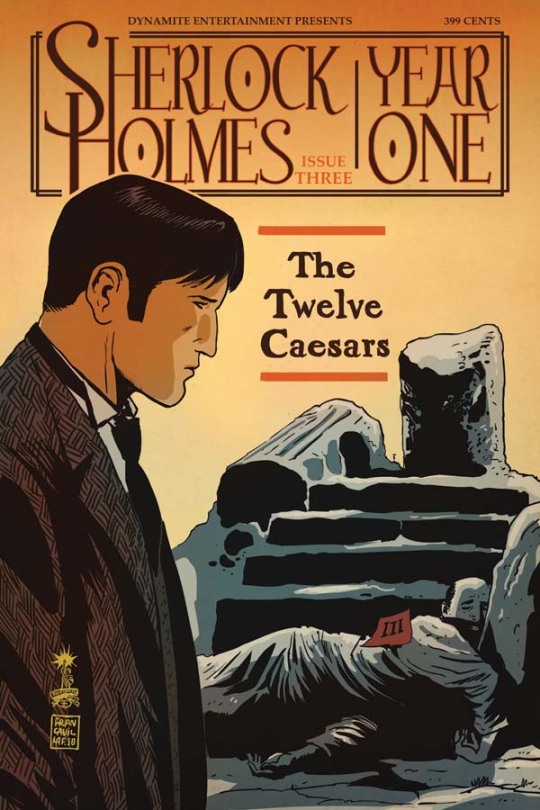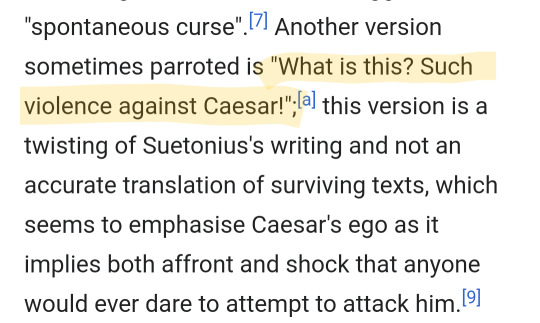#the twelve caesars
Explore tagged Tumblr posts
Text

2,000-Year-Old Book About Roman Emperors Enters Bestseller Charts
The Lives of the Caesars, translated from Latin by The Rest Is History podcast co-host Tom Holland, details everything from ancient policy failures to sex scandals.
A gossipy account of the lives of Roman emperors has entered the bestseller charts – 2,000 years after it was written.
Sex scandals and foreign policy failures don’t only beleaguer the modern politician, it turns out: in the early second century, the scholar Suetonius chronicled the dramas of the first set of Roman emperors, and now, their indiscretions and eccentricities have been dug up in a new translation which is proving popular in bookshops.
The Lives of the Caesars, translated from Latin by The Rest Is History podcast co-host Tom Holland, made the Sunday Times hardback nonfiction chart this week. Publisher Penguin Classics said that the book is the first of their hardback nonfiction classics to appear on the list.
The book is a collection of 12 biographies covering the rule of Julius Caesar and the first 11 Roman emperors. On hearing that it was in the charts, Holland was “delighted for Suetonius, to see the lad is capable of getting on the bestseller list after two millennia”.
The book, published on 13 February, comes 18 months after ancient Rome became the centre of a major internet pop culture moment, when women began asking men how often they think about the Roman empire, and posting their responses online.

Holland cites several reasons for the continued fascination. Rome has “always” been the ancient civilisation that people in Britain and the west have been most interested in, partly because Britain was part of the Roman empire, and the English alphabet is Latin. “We feel closer to the Romans, perhaps, than we do to the Egyptians or the Assyrians.”
However, “it’s also partly because our understanding of power derives from Rome more than anywhere else”. The US “Republican system was modelled on that of ancient Rome, but the [Roman] Republic ended up becoming an autocracy, and so in America, there’s always been this anxiety that a Republican system of government may end up an autocracy, and I guess that at the moment, that anxiety has a particular salience.”
Suetonius wrote The Lives of the Caesars, commonly known as The Twelve Caesars, in the early second century AD during the reign of Hadrian. “I think the reason that it’s always been popular is the fact that it is full of the most sensational gossip. It is kind of ancient Rome’s Popbitch. It is full of scandal, and extraordinary detail, but it is also very psychologically astute,” says Holland. “It has the quality of a very highbrow gossip column.”

“Had there been bestseller lists in second-century Rome, Suetonius’s Lives of the Caesars would undoubtedly have been on them,” said Stuart Proffitt, publishing director at Penguin Press.
Holland says the reach of The Rest Is History will have helped the book’s sales. The podcast released four episodes on Suetonius and the same month had 17.5m downloads.
He compared the process of translating Suetonius’ work to a marriage. “You spend a long time, a long period with someone who you think you’re going to enjoy the company of, so it’s always good to discover that actually you do.”
By Ella Creamer.
Gaius Suetonius Tranquillus, commonly referred to as Suetonius (c. AD 69 – after AD 122), was a Roman historian who wrote during the early Imperial era of the Roman Empire. His most important surviving work is De vita Caesarum, commonly known in English as The Twelve Caesars, a set of biographies of 12 successive Roman rulers from Julius Caesar to Domitian. Other works by Suetonius concerned the daily life of Rome, politics, oratory, and the lives of famous writers, including poets, historians, and grammarians. A few of these books have partially survived, but many have been lost.


#2000-Year-Old Book About Roman Emperors Enters Bestseller Charts#Tom Holland#Suetonius#The Twelve Caesars#The Lives of the Caesars#book#autor#history#history news#ancient history#ancient cultures#ancient civilizations#ancient rome#roman history#roman empire#roman emperor
26 notes
·
View notes
Text
The Killing of Gaius Iulius Caesar

from Suetonius' De Vita Caesarum, vita divi iuli 82.
Assidentem conspirati specie officii circumsteterunt, ilicoque Cimber Tillius, qui primas partes susceperat, quasi aliquid rogaturus propius accessit renuentique et gestu[m] in aliud tempus differenti ab utroque umero togam adprehendit: deinde clamantem: 'ista quidem uis est!' alter e Cascis auersum uulnerat paulum infra iugulum. Caesar Cascae brachium arreptum graphio traiecit conatusque prosilire alio uulnere tardatus est; utque animaduertit undique se strictis pugionibus peti, toga caput obuoluit, simul sinistra manu sinum ad ima crura deduxit, quo honestius caderet etiam inferiore corporis parte uelata. atque ita tribus et uiginti plagis confossus est uno modo ad primum ictum gemitu sine uoce edito, etsi tradiderunt quidam Marco Bruto irruenti dixisse: kai su teknon; exanimis diffugientibus cunctis aliquamdiu iacuit, donec lecticae impositum, dependente brachio, tres seruoli domum rettulerunt. nec in tot uulneribus, ut Antistius medicus existimabat, letale ullum repertum est, nisi quod secundo loco in pectore acceperat. Fuerat animus coniuratis corpus occisi in Tiberim trahere, bona publicare, acta rescindere, sed metu Marci Antoni consulis et magistri equitum Lepidi destiterunt.
'When he had taken his seat, the conspirators stood round him, under colour of paying their compliments; and immediately Tullius Cimber, who had engaged to commence the assault, advancing nearer than the rest, as if he had some favour to request, Caesar made signs that he should defer his petition to some other time. Tullius immediately seized him by the toga, on both shoulders; at which Caesar crying out, “Violence is meant!” one of the Cassii wounded him a little below the throat. Caesar seized him by the arm, and ran it through with his style ; and endeavoring to rush forward was stopped by another wound. Finding himself now attacked on all hands with naked poniards, he wrapped the toga about his head, and at the same moment drew the skirt round his legs with his left hand, that he might fall more decently with the lower part of his body covered. He was stabbed with three and twenty wounds, uttering a groan only, but no cry, at the first wound; although some authors relate, that when Marcus Brutus fell upon him, he exclaimed, in Greek, "Thou too, my son?” The whole assembly instantly dispersing, he lay for some time after he expired, until three of his slaves laid the body on a litter, and carried it home, with one arm hanging down over the side. Among so many wounds, there was none that was mortal, in the opinion of the surgeon Antistius, except the second, which he received in the breast. The conspirators meant to drag his body into the Tiber as soon as they had killed him; to confiscate his estate, and rescind all his enactments; but they were deterred by fear of Mark Antony, and Lepidus, Caesar’s master of the horse, and abandoned their intentions.'
illus. The Murder of Caesar by Piloty.
#bits and pieces#language#ides of march#julius caesar#suetonius#the lives of the caesars#the twelve caesars#de vita caesarum#latin#lingua latina#tagamemnon#rome#roman
13 notes
·
View notes
Text






Cover art by Francesco Francavilla for the six issues of "Sherlock Holmes: Year One" by Scott Beatty and Daniel Indro (January-June 2011, Dynamite Entertainment)
"The Butler Did It," "Beware of the Ides of March," "The Twelve Caesars," "Ships are Safe in Harbor," "Watching the Detectives," and "London's Burning, London's Burning"
#theres several versions of these covers by different artists so more incoming#sherlock holmes#comics#dynamite holmes#dynamite comics#dynamite entertainment#sherlock holmes: year one#Francesco francavilla#scott beatty#daniel indro#the butlers did it#beware the ideas of march#the twelve caesars#ships are safe in harbor#watching the detectives#londons burning londons burning#comic book covers#comic book#comic#comic book art#comic books
27 notes
·
View notes
Text
Gaius more like gay-yass
9 notes
·
View notes
Photo
More of that Ides of March humour!

I was reading up on Ceasar’s last words (as one does) and I came upon this one that has the Biggest Miette Energy
56K notes
·
View notes
Text

"The Twelve Caesars" by Gaius Suetonius Tranquillus
0 notes
Text

The Death of Caesar by Jean-Léon Gérôme. French, 1858-1867. Oil on canvas. In the Walters Art Museum, Baltimore.
According to Suetonius in his Vita Divi Juli (translated by J.C. Rolfe):
As he took his seat, the conspirators gathered about him as if to pay their respects, and straightway Tillius Cimber, who had assumed the lead, came nearer as though to ask something; and when Caesar with a gesture put him off to another time, Cimber caught his toga by both shoulders; then as Caesar cried, "Why, this is violence!" one of the Cascas stabbed him from one side just below the throat. Caesar caught Casca's arm and ran it through with his stylus, but as he tried to leap to his feet, he was stopped by another wound. When he saw that he was beset on every side by drawn daggers, he muffled his head in his robe, and at the same time drew down its lap to his feet with his left hand, in order to fall more decently, with the lower part of his body also covered. And in this wise he was stabbed with three and twenty wounds, uttering not a word, but merely a groan at the first stroke, though some have written that when Marcus Brutus rushed at him, he said in Greek, "You too, my child?" All the conspirators made off, and he lay there lifeless for some time, and finally three common slaves put him on a litter and carried him home, with one arm hanging down. And of so many wounds none turned out to be mortal, in the opinion of the physician Antistius, except the second one in the breast.
#Ides of March#Julius Caesar#recreating an old popular post of mine with a better image of this painting#and crediting the translator#Suetonius#Caesar#assassination of Caesar#history#ancient history#art#painting#Jean-Léon Gérôme#Walters Art Museum#Lives of the Twelve Caesars#life of Caesar#death of Caesar#translation#J.C. Rolfe
245 notes
·
View notes
Text
Does Hans' horse have a name?
#kcd2#hans capon#im calling him Incitatus if not because i can see that part of The Twelve Caesars getting a chuckle from him#please let me have my obnoxious Classics bro Capon hc#“ugh you named your horse Bucephalus how original...”
8 notes
·
View notes
Text
Happy Ides of March to all who celebrate! Here's my Cinna the poet/Cinna the conspirator sonnet:
But mightier than these, both pen and sword— Though you may make Rome's streets run red with blood And I, with one precisely chosen word, Can float your name untouched above the flood— Is time, but not the blind, remorseless foe Who crushes all beneath his sandaled feet Inevitable as empire, and as slow For in the end, the race goes to the fleet. No pen is quick enough to catch your breath The way it catches quick against my skin; No dagger's keen enough to deal the death That, in the dying moment, dies again: Each one a Rubicon. The die is cast, And, worse than senseless, slips into the past.
(on AO3)
#man it's been twelve years since i wrote that#still a banger if i do say so myself#minutia's fic#julius caesar#cinna the poet#cinna the conspirator
53 notes
·
View notes
Note
Could I ask if you have any books that focus on the Julio Claudian era that you’d recommend? I’m just starting to learn about it for fun!
Okay there's the classic Twelve Caesars by Suetonius if you want an ancient source. Based off of that you can read/watch the adaptation of Robert Graves' I, Claudius which covers Caesar Octavianus to the ascension of Nero
For an overview of the waning Republic through the Julio Claudians there's Sculliard's 'From the Gracchi to Nero'. I'm mostly a late Republic girly so I always have to recommend Tom Holland's Rubicon but I believe he has a book titled Pax about the Julio Claudians and I think going into the Flavians as well. I haven't read it yet but Tom Holland is up there with Mary Beard for historians whose books I will blindly recommend because they're my heroes.
And if you want a bonus niche deep dive book I would absolutely recommend The Power of Images in the Age of Augustus by Zanker
Feel free to add recommendations to this post to help anon out
#roman history#ancient rome#roman republic#rome#roman empire#how often do you think about the roman empire#ancient history#julius caesar#julio claudians#julio claudian dynasty#Augustus#i Claudius#Robert Graves#mary beard#tom Holland#suetonius#twelve Caesars
8 notes
·
View notes
Text

Nec successum victoriae moderatus est, sed capite Bruti Romam misso, ut statuae Caesaris subiceretur.
'And now [Augustus], intoxicated with success, sent the head of Brutus to be cast at the foot of Caesar’s statue.'
Suetonius, De Vita Caesarum, vita divi augusti, 13. tr. Thompson.
#ides of march#julius caesar#latin#lingua latina#tagamemnon#augustus caesar#suetonius#the twelve caesars#de vita caesarum#rome#roman
4 notes
·
View notes
Text






Cover art by Aaron Campbell for the six issues of "Sherlock Holmes: Year One" by Scott Beatty and Daniel Indro (January-June 2011, Dynamite Entertainment)
"The Butler Did It," "Beware of the Ides of March," "The Twelve Caesars," "Ships are Safe in Harbor," "Watching the Detectives," and "London's Burning, London's Burning"
#can't say im a fan of the fifth one#a number of choices made and nome necessary#sherlock holmes#comics#sherlock holmes comic#dynamite holmes#dynamite#dynamite entertainment#dynamite comics#sherlock holmes year one#aaron campbell#daniel indro#scott beatty#the butler did it#beware of the ideas of march#the twelve caesars#ships are safe in harbor#watching the detectives#londons burning londons burning#graphic novels#holmes#comic book covers
9 notes
·
View notes
Text

From "The Twelve Tasks of Asterix" ("Les Douze travaux d'Astérix", 1976)
#time to post this again!#Julius Caesar#Brutus#Beware the ides of March#The Ides of March#The Twelve Tasks of Asterix#Les Douze travaux d'Astérix#Motionpicturelover's GIF
26 notes
·
View notes
Text
Me when someone says that Cassius is the main villain: How dare you?! Cassius is totally justified, and here’s my 12 page essay on why.
Me when someone says that Brutus is the main villain: ERM EXCUSE ME WHAT ABOUT CASSIUS?!?!?!?!
#julius caesar#Caius cassius#Marcus Brutus#I could honestly write a twelve page essay on why Cassius isn’t the villain#but also Brutus doesn’t deserve the credit he only did it because Cassius manipulated him and lied to him#that doesn’t make Cassius the villian we’ve all done it
7 notes
·
View notes
Text

ily Mary Beard never change
2 notes
·
View notes
Text
suetonius babygirl be consistent with your portrayal of augustus for once the man himself has enough neuroses i don't need you to add to them
#rambles#classical civilisation#analysing twelve caesars and the res gestae rn on new year's eve yayyy
1 note
·
View note